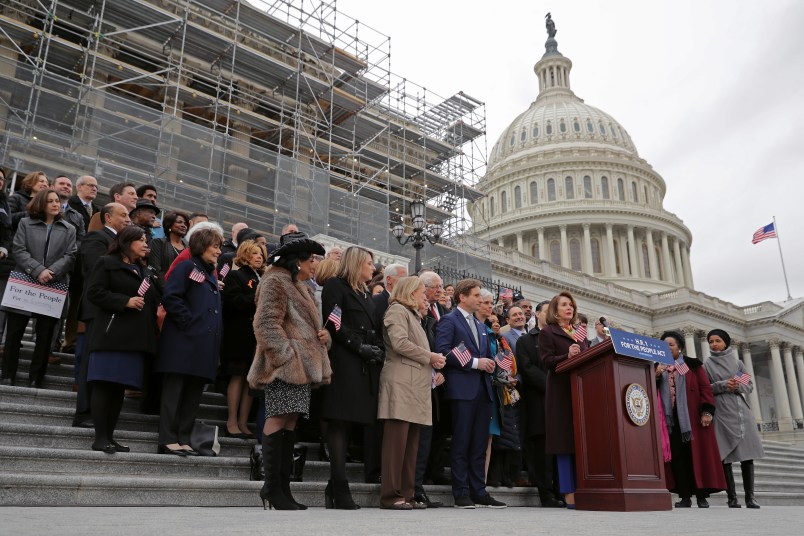WASHINGTON (AP) — The Democratic-controlled House on Friday approved legislation aimed at reducing the role of big money in politics, ensuring fair elections and strengthening ethics standards. But it stands little chance in the Republican-run Senate, where the GOP leader has pledged it will not come up for a vote, and the White House issued a veto threat.
The House measure would make it easier to register and vote, and would tighten election security and require presidential candidates to disclose their tax returns.
Election Day would become a holiday for federal workers, and a public financing system for congressional campaigns would be set up. The legislation approved 234-193 would bar voter roll purges such as those seen in Georgia, Ohio and elsewhere, and restore voting rights for ex-prisoners. It was a straight party-line vote, with all Democrats voting “yes” and all Republicans voting “no.”
Republicans called the bill a Democratic power grab that amounts to a federal takeover of elections. Senate Majority Leader Mitch McConnell, R-Ky., said the proposal was dead on arrival in that chamber.
The White House said in a statement that the Democrats’ plan would “micromanage” elections that now are run largely by states and would establish “costly and unnecessary program to finance political campaigns.”
But House Speaker Nancy Pelosi, D-Calif., said the bill “restores the people’s faith that government works for the public interest, the people’s interest, not the special interests.”
Trying to turn Republicans’ words against them, Pelosi said, “Yes it is a power grab — a power grab on behalf of the people.”
House GOP leader Kevin McCarthy of California said the legislation would undermine the integrity of elections by allowing convicted felons to vote, and would apply a one-size-fits-all standard to elections now run by states and local governments.
Democrats called that a mischaracterization.
To Rep. Zoe Lofgren, D-Calif., the bill “grabs power away from the elites and the power brokers and gives it to the people.”
She and other Democrats disputed the claim that taxpayers will pay for campaigns, noting that money for political campaigns would come from a surcharge on federal settlements made with banks and corporations that run afoul of the law.
This bill would allow “everyday Americans to become power brokers” with small contributions of $50 or $75 that would be matched at a 6-to-1 rate by the government, said Rep. John Sarbanes, D-Md., the bill’s main author.
Still, Republicans warned that the price tag could run into the billions.
“Regardless of what they disguise it as, make no mistake that the position of Democrats is to fund politicians’ campaigns using taxpayer funds,” said Rep. Rodney Davis, R-Ill.
The bill also “weakens safeguards to voting and registration practices that open the door to fraud” and attempts to limit free speech, said Davis, citing disclosure requirements for political donations.
The bill would create automatic national voter registration while expanding access to early and online registration. It would prohibits voter roll purges such as those seen in Georgia, Ohio and elsewhere, and increase federal support for state voter systems, including paper ballots to prevent fraud.



